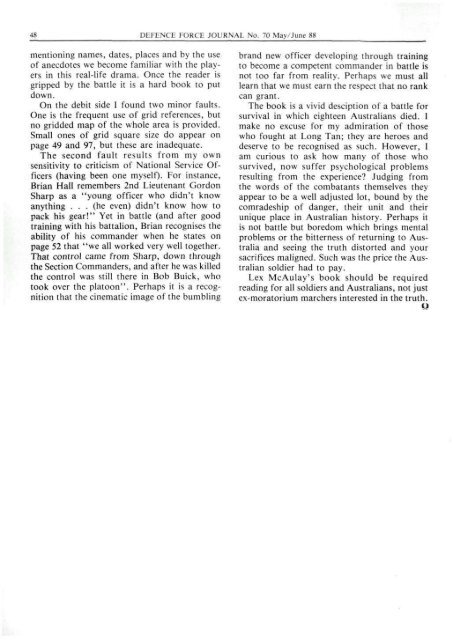ISSUE 70 : May/Jun - 1988 - Australian Defence Force Journal
ISSUE 70 : May/Jun - 1988 - Australian Defence Force Journal
ISSUE 70 : May/Jun - 1988 - Australian Defence Force Journal
Create successful ePaper yourself
Turn your PDF publications into a flip-book with our unique Google optimized e-Paper software.
48 DEFENCE FORCE JOURNAL No. <strong>70</strong> <strong>May</strong>/<strong>Jun</strong>e 88<br />
mentioning names, dates, places and by the use<br />
of anecdotes we become familiar with the players<br />
in this real-life drama. Once the reader is<br />
gripped by the battle it is a hard book to put<br />
down.<br />
On the debit side I found two minor faults.<br />
One is the frequent use of grid references, but<br />
no gridded map of the whole area is provided.<br />
Small ones of grid square size do appear on<br />
page 49 and 97, but these are inadequate.<br />
The second fault results from my own<br />
sensitivity to criticism of National Service Officers<br />
(having been one myself)- For instance,<br />
Brian Hall remembers 2nd Lieutenant Gordon<br />
Sharp as a "young officer who didn't know<br />
anything ... (he even) didn't know how to<br />
pack his gear!" Yet in battle (and after good<br />
training with his battalion, Brian recognises the<br />
ability of his commander when he states on<br />
page 52 that "we all worked very well together.<br />
That control came from Sharp, down through<br />
the Section Commanders, and after he was killed<br />
the control was still there in Bob Buick, who<br />
took over the platoon". Perhaps it is a recognition<br />
that the cinematic image of the bumbling<br />
brand new officer developing through training<br />
to become a competent commander in battle is<br />
not too far from reality. Perhaps we must all<br />
learn that we must earn the respect that no rank<br />
can grant.<br />
The book is a vivid desciption of a battle for<br />
survival in which eighteen <strong>Australian</strong>s died. I<br />
make no excuse for my admiration of those<br />
who fought at Long Tan; they are heroes and<br />
deserve to be recognised as such. However, I<br />
am curious to ask how many of those who<br />
survived, now suffer psychological problems<br />
resulting from the experience? Judging from<br />
the words of the combatants themselves they<br />
appear to be a well adjusted lot, bound by the<br />
comradeship of danger, their unit and their<br />
unique place in <strong>Australian</strong> history. Perhaps it<br />
is not battle but boredom which brings mental<br />
problems or the bitterness of returning to Australia<br />
and seeing the truth distorted and your<br />
sacrifices maligned. Such was the price the <strong>Australian</strong><br />
soldier had to pay.<br />
Lex McAulay's book should be required<br />
reading for all soldiers and <strong>Australian</strong>s, not just<br />
ex-moratorium marchers interested in the truth.

















